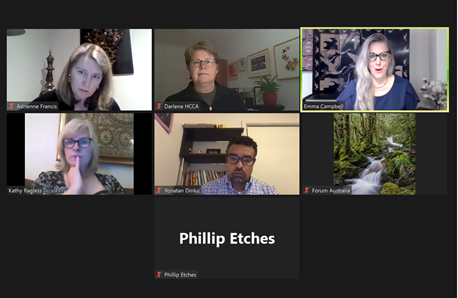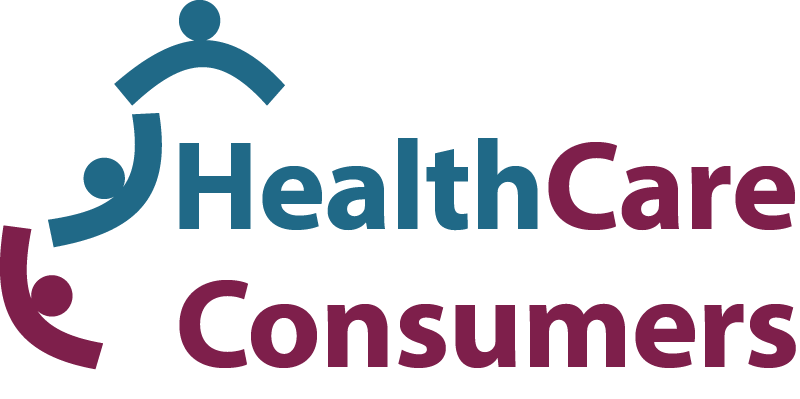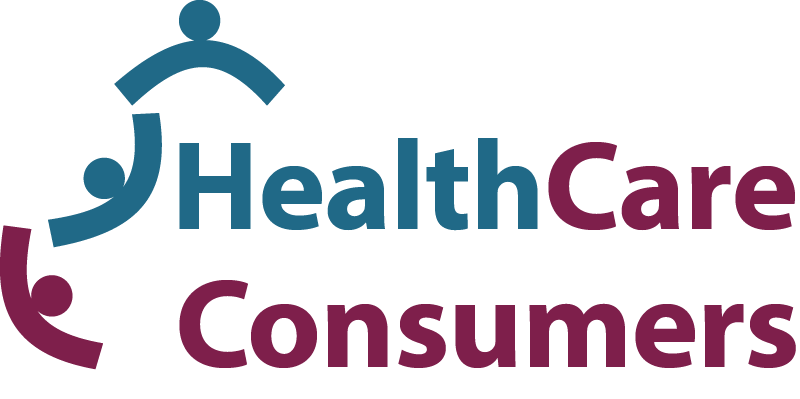Publications
COVID-19: Impact on Canberra’s Social Fabric Speech by Darlene Cox
13 October 2021
Talk given by Darlene Cox at the ‘COVID-19: Impact on Canberra’s Social Fabric’ online forum on 12 October 2021.
I am Darlene Cox, Executive Director at the Health Care Consumers’ Association.
I acknowledge I’m on Ngunnawal Country and pay my respects to Elders past present and emerging leaders.
The Health Care Consumers’ Association (HCCA) is the peak consumer advocacy organisation in the Canberra region on health matters. We advocate for consumer interests in health care. We are a community group made up of around 150 individuals and 30 organisations who share an interest in high quality health care that meets the needs of consumers, carers and our communities. We are funded by the ACT Government.
One of the things we do is to train and support members of the community to become consumer representatives and provide consumer perspectives on health care. We support around 50 consumer representatives on more than 100 committees in the ACT. We also undertake research projects on consumer experience and expectations of health care.
For over 40 years we have been a critical friend of governments and provided consumer insights.
Since March 2020, with the first wave of the pandemic, we’ve worked closely with health services in the ACT to develop their clinical response. Our organisation is committed to the principle of consumer empowerment and for us that means people being in charge of our own health. We’re also very focused on the delivery of safe, high quality healthcare. We want a system where consumers are actively involved in decision making and to feel supported to ask questions and then get the answers in a way we understand. We have been applying this approach to what’s happening with COVID-19 and tonight I’ll share a few reflections.
I am a member of a committee called the Clinical Health Emergency Coordination Centre. This committee provides advice to the Chief Health Officer regarding the clinical response to COVID-19. Its members are senior leaders of the ACT health public health and hospital system. My role is NGO and Community Liaison, so I spend my days talking with consumers and community organisations about their experience of COVID-19.
The pandemic has underscored the importance of thinking about our systems and processes in terms of people – the people who deliver the care, the people who provide testing and vaccination, the drivers, the contact tracers, the behind the scenes people who are working through the policy and legislative changes, the people who deliver medicines, pathology samples, equipment, the pathologists and of course the people who access health care and our families and friends. This is all about people and communities.
COVID-19 has underscored the importance of the voice of experts in public policy and developing a response. Misinformation is dangerous. Public Health and Infectious Disease physicians, microbiologists and epidemiologists have been at the forefront of the public policy debates. In the ACT we have done very well not to politicise this.
The direct and early engagement with specialist local community organisations in the development and rollout of any public health campaign is really important. The expertise that rests in community members and community organisations has also been recognised. This has been demonstrated in how the government has responded to the pandemic and the needs of multicultural communities and those people who are living with significant disadvantage – those who live in crowded homes or have unstable housing. People who have very low income and have lost work because of lockdown, and people who may have issues with addiction. We have focused on the needs of those people who are more likely to have poor outcomes if they get COVID-19. We all need to play a part to ensure that no one is left behind.
The response in social housing at Condamine Court in Turner and Ainslie Village has demonstrated the importance of working with community organisations who understand the challenges many of these people face. We need to hear the voices of community leaders and community members. We cannot make assumptions about what people need. And work with the people they trust who can give them a voice. We need to challenge the judgment and stigma many people face.
Organisations like CAHMA (the Canberra Alliance for Harm Minimisation and Advocacy) which has long been recognised in the public health area as an important organisation supporting people who use drugs. Peer support made a real difference in helping people feel safe and talk about their needs in a non-judgemental way. Directions is a health service that provides drug and alcohol treatment and support and works with people who are experiencing significant challenges. They worked alongside the clinical staff from Canberra Health Services to provide health care to the tenants. Directions have been an important service to roll out vaccination to tenants of public and social housing and clients of homelessness services.
Communication has been extremely important during the pandemic. We can’t forget important consumer issues like informed consent, the involvement of family and friends, feeling supported to ask questions and having things explained to us in a way that we can understand. These things are central to high quality health care. This includes the use of Translating and Interpreting Service and the translation of materials into community languages.
The way we access health care has changed in the pandemic. We have seen an increase in the use of telehealth. This has been an effective option to reduce the transmission of the virus. Digital Health has been held out as a way to transform health care for years but has not come to pass yet. COVID-19 has been wonderfully disruptive and helped advance this. We can phone our GP for a consultation, get an electronic script sent to a pharmacy of our choice and they can deliver medications for us. Telehealth does not work for everyone and it is not replacement for face to face consultations, but it has made a difference to many. The same with telehealth appointments in outpatient clinics.
Another way COVID-19 has changed the experience of care is with the introduction of visitor restrictions. These restrictions are hard but it’s about keeping people safe. They are designed to prevent the spread of the virus and ensure the safest environment possible for patients and health care workers. We know that these policies are placing additional strains on staff, especially nurses. It can also lead to unintended safety consequences for patients, as we may be more at risk of falls, not being able to eat our food or there being delayed recognition of deterioration.
Close friends and family members of patients are an essential part of healthcare teams. They provide an added layer of patient support and patient safety, and act as advocates for us when we are not able to do it ourselves.
Consumers and families have accepted the restrictions but in return want assurance that staff are able to involve family in bedside handover, discharge planning, medical rounds and other important interactions. This has not been as smooth as we need it to be. It takes time and planning to involve family and friends in this way and the staff are under incredible pressure.
Visitor restrictions also exacerbate inequities among patients and families who may not have the resources that many of us enjoy. Not everyone has equal access to the technologies we need to connect virtually.
We provide information sessions and workshops to consumers and community groups to build understanding of the health system. We call this health literacy. Health literacy is about people having the knowledge, skills and confidence to:
- Find, understand, and use health information
- Be active partners in their care, and
- Navigate health and social support systems
Across our communities our health literacy has increased during the pandemic. We learned the language of the pandemic: Flatten the curve, surge capacity, personal protective equipment (PPE), double dose, ‘test, trace, isolate, quarantine’ (TTIQ), epidemiology, breakthrough infections. So many terms we now find ourselves using in conversation.
We are more attune to health messages. At HCCA we have provided significant feedback to Government on messaging for communities, the importance of using plain language, minimising the use of technical terms and medical jargon. By the way, next week is Drop the Jargon Day. This is a day for professionals in Australian health, community services and local government to use plain language.
Many of us have changed our behaviour in the pandemic – we maintain physical distance, we wash our hands properly, wear a mask, check the exposure locations, and use the check in app. Many of us have regularly tuned into the daily press conference and check social media for updates.
But there is still a need for us to understand more about the disease. I don’t mean as clinicians, but to be able actively manage our health. We need to know what to look out for, what the symptoms are, when to get tested, when to isolate, when to call the GP, or the ambulance to go to hospital. We need to know the signs to look out for and what our options are to escalate matters. Asking questions is an important part of keeping yourself safe in the health system. We have seen that people can deteriorate quickly.
My final point. The power of evaluation and reflection is often undervalued. I think it is even more important in times of crisis like now. We need to take the time to think back on what’s worked well and consider what we need to change to improve our individual and collective response to a situation. I encourage everyone to take a moment to reflect on what’s been happening and think about the changes we can make to ensure that people get equitable access to the health care and social supports they need to keep them safe.
The way we have mobilised and responded to a significant threat has been really good. I only hope we can start to apply the same focus to responding to climate change.
Thank you.

A recording of the event is available on Youtube here

